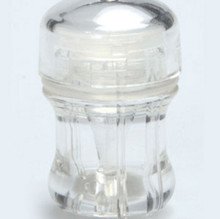
July 25, 2018
Louise Joy Brown entered the world 40 years ago today, instantly gaining fame as the world's first test tube baby.
Since that momentous birth in England on July 25, 1978, at least 8 million babies have been born thanks to in vitro fertilization – a process that removes eggs from a woman's ovaries, mixes them with sperm in a Petri dish, and places the fertilized embryos into the woman's uterus.
Now, a less expensive, more natural fertilization procedure is gaining steam in the United States. And Penn Medicine is the first healthcare provider in Pennsylvania to offer it.
The procedure is similar to IVF. But it uses an intravaginal culture device to fertilize the extracted eggs in a woman's vagina, eliminating the need to incubate them in the laboratory.
The woman places the device – a polystyrene capsule about the size of a tampon – into her vagina for three to five days. Doctors then remove the device and immediately place fertilized embryos inside the woman's uterus.
Compared to traditional IVF, the procedure requires fewer eggs, less medication for follicle stimulation and fewer ultrasounds and bloodwork. All of that means it can cost less money.
"There's also some patients who feel that it's a little bit more natural," said Dr. Clarisa Gracia, the medical director at Penn Fertility Care. "They don't like the idea of their eggs and embryos growing outside of the body. For some people, they feel they're a little bit more involved in the process, which I think can be helpful."
The device, known as INVOcell, pictured below, has been available in Europe since 2008. But it was not approved by the U.S. Food and Drug Administration until November 2015.
INVO Bioscience, the Massachusetts company that markets the device, has been training physicians across the country.
Penn Medicine is the only healthcare provider in the Philadelphia region offering the procedure. But they have yet to conduct one.
The INVOcell procedure typically costs about $6,000 to $8,000, Gracia said. That's less expensive than traditional IVF, which typically runs about $10,000 due to more lab work, ultrasounds and blood testing.
"Because you're not stimulating people with so much medication and so aggressively, you can do a little less monitoring," Gracia said. "Typically, you do ultrasounds and bloodwork a couple times during a cycle rather than 5 to 8 times during a stimulation cycle (for IVF). There less monitoring and less stimulation."
The procedure was first developed as an option for couples living in underdeveloped countries.
But there also are underserved populations in the United States, Gracia said. She pointed to North and South Dakota, which each only have one IVF clinic.
"There are multiple states where patients have difficulty accessing IVF care," Gracia said. "If they have to stay in hotels for weeks or travel hours (to get there), that's a barrier."
Follow John & PhillyVoice on Twitter: @WriterJohnKopp | @thePhillyVoice
Like us on Facebook: PhillyVoice
Add John's RSS feed to your feed reader
Have a news tip? Let us know.
